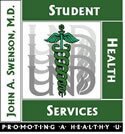|
Stress
Stress is the way our bodies respond to any new, threatening, or exciting situation. It can be caused by anything that places an extra demand on us. This can be both good and bad. Helpful stress allows us to be productive and attain our goals. Harmful stress, such as that which we all experience around mid-terms or finals, can be overwhelming. To some people, stress describes the frantic pace of everyday life. To others, stress is what you feel during times of conflict, loss, or illness. People find different things stressful and react to stress differently. Your stress response might help you catch yourself if you trip, or steer your car to avoid a crash. But today's stress, especially when caused by psychological or emotional factors, can be prolonged and can have damaging effects on your health.
Stress affects us in a holistic way. Physically, symptoms of stress can include headaches, fatigue, upset stomach, soreness and muscle tension, colds, and insomnia. Emotionally, stress expresses itself through depression, fear, anxiety, anger, lack of confidence, cynicism, and lack of humor. Social signs of stress include loneliness, withdrawal, aggressiveness, phoniness, and rejection. Intellectually, stress shows up as inability to concentrate, feeling apathetic or bored, lacking creativity, and difficulty making decisions. Finally, stress can impact us spiritually by causing us to feel hopeless, guilty, desperate, empty, and lacking joy.
Health effects of stress:
- Stress can cause sleep problems, leaving you fatigued and vulnerable to accidents and illness.
- It can cause anxiety, nervousness and irritability, making it difficult to get along with people.
- Stress can affect your concentration, making you perform poorly at school or on the job.
- Stress can cause weight gain or weight loss.
- Stress seems to weaken the immune system, making you more vulnerable to colds and other diseases, possibly even some types of cancer.
- Stress can spur you to abandon healthy habits, such as exercising and eating well, which may in turn create other health problems.
- Stress may not actually cause digestive problems, but it can be a contributing factor that makes them worse.
- Stress is also an important contributing factor in many conditions, such as heart disease, high blood pressure, headaches, arthritis, and even menstrual disorders.
Self-care tips for your short-term stress:
- Start your work early. Balance work and play. Budget your time.
- Maintain healthy eating, good health habits, and adequate sleep.
- Take breaks every hour--work for 50 minutes, take a break for 10.
- Drink herbal tea (instead of coffee as caffeine can worsen stress symptoms).
- Exercise regularly. Take a walk or jog. Do yoga or other slow stretching.
- Modify your environment to manage your exposure to factors that cause stress.
- Reward yourself for meeting short-term goals. Learn acceptance.
Long-term ways to handle stress:
- Seek your own stress level.
- Choose your own goals.
- Develop a support system.
- Think positive.
- Make decisions.
- Keep your expectations realistic.
- Accept what you cannot change.
- Anticipate potentially stressful situations and prepare for them.
- Live in the present.
Resource Links:
v Health World Online. Stress. (www.healthy.net/asp/templates/Article.asp?Id=1416)
v Health Education: Stress, Depression, Anxiety, Drug Use. (www.teachhealth.com)
v The American Institute of Stress. Stress. (www.stress.org)
v Brigham Young University. Managing Stress as a College Student. (www.byu.edu/ccc/Counseling/mental_health/managing.htm)
v Carleton College. Midterm Stress. (http://webapps.acs.carleton.edu/campus/wellness/info.php3?id=8)
v University of California-Riverside. Assisting the Emotionally Distressed Student. A Guide for faculty and Staff. (www.students.ucr.edu/counseling/handbook.html)
v Pennsylvania State University. If you are in college, you need to read this. (www.personal.psu.edu/users/j/e/jeh279/dorms.html)
v Drkoop.com. Mental Health. (www.drkoop.com/dyncon/article.asp?ptp=true&id=7061&at=)
v (www.anxiety-panic-stress.com)
 Back to Top 20 Health Issues Back to Top 20 Health Issues
|
|


